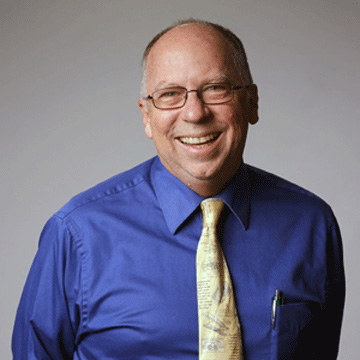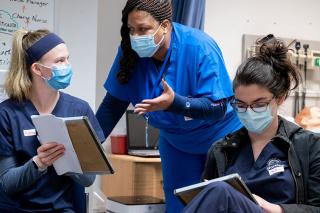
School of Social Work Adjunct Professor Steve O'Neill '81MSW has been part of a movement to make healthcare more transparent and to actively engage patients. He has spearheaded the use of OpenNotes for mental health practitioners at Beth Israel Deaconess Medical Center, where O'Neill is a Social Work Manager and Behavioral Health Specialist. He began the program by opening up psychotherapy notes to patients in all of the ambulatory clinical programs, and researched the effect of this on both therapists and patients. Most recently, OpenNotes was named an "Interoperability Hero" by the nonprofit DirectTrust, who recognized "their work to foster and evaluate the spread and implementation of shared clinical notes ("open notes"), and advance healthcare transparency initiatives in the U.S. and overseas." O'Neill also teaches in the Center for Bioethics at Harvard Medical School.
Tell us about OpenNotes.
OpenNotes started as a movement by a group of primary care clinicians at Beth Israel, to make transparency more central in healthcare. Transparency in turn makes us accountable to our patients, which increases their trust. Especially once COVID-19 hit, there was hesitation to trust healthcare systems and providers, which is evidence of a lack of trust. We want to have partnerships with patients, which results in greater engagement and improved care.
At first, the idea of opening up psychotherapy notes was very controversial, and many of my colleagues were resistant. I've given my own patients access to their clinical notes for more than 30 years, so they knew my commitment to the concept. There was a thought, for example, that paranoid patients would flee, but they didn't — in fact, it made them less paranoid and more trusting. We did research around the globe to document that it is highly beneficial for most patients of all backgrounds to have access to these notes.
In 2016, a federal mandate required clinicians to open these records to patients and went into effect in April, 2021. While providers can still block notes for particular patients if deemed necessary, overall we have seen a positive use in mental healthcare. Prior to this act, 55 million Americans already had OpenNotes. All the things people were worried would happen would have already happened.
How does this relate to your work in bioethics?
I also helped to start the ethics program at Beth Israel, as a bioethics consultant. In disagreements between patients, family members, and medical staff, my notes would be available to anyone involved in the consult, including any evaluation I would provide. I share a draft of the notes to make sure that all perspectives are captured accurately and view the note itself as a teaching opportunity. The legal department was worried that this would increase risk management, but in fact it decreased because we were doing preventative work, providing solutions without legal action. I encourage students to add a lens of bioethics to their professional studies; the more interdisciplinary we are, including with the patient or proxy as part of the team, the more transparent we are, and the more trusting our patients will be.
A colleague published a study that 25% of physicians found that patients discovered material errors in their chart demonstrating the safety issues which patients can then help us to rectify. In addition, research shows that patients don't hear 70-80% of what you say in a given visit when you are delivering 'bad news.' In my own experience, when my daughter was diagnosed with leukemia as a child, I didn't hear anything the doctor said in those first four or five meetings. It wasn't until they said that they could save her life that I could hear anything. Given that, it's helpful to go back to the doctor's notes to refresh yourself.
In mental health settings, if a person is anxious and depressed, how can they retain things you tell them? Some of my patients would print out their note and put it somewhere to look at when they got anxious. It becomes a useful reminder of what to do. Also, patients who are on medication are more adherent to taking the medication if they understand why they are taking it; the notes can provide that clarity.
Any advice for students?
The best advice I ever got was to get a social work degree; it gives you unbelievable versatility. You can go into community organization, policy, clinical care, among other options. It's also pushed me outside of my comfort zone. I don't like writing, but I've been publishing articles and chapters, and I wrote a book. I've done a lot of things I never thought I would: clinical care, teaching, research. Now is an especially exciting time, with opportunities for greater patient engagement. Some hospitals have patient/family advisory councils, where they share policies before implementing them. It's amazing how this opens up doors and gets new perspectives on things.
I was involved in putting together the crisis standards of care for Massachusetts prior to the pandemic. We put together the guidelines and tested them in hospital settings, but we also engaged with patients about the protocol. We included equity issues, to avoid putting people in underprivileged communities in double jeopardy because they don't have equitable access to healthcare. It's important to partner with patients in a more active way and engender more trust in the atmosphere, including across the country. It's usually when people are hiding things that we get in the most trouble. OpenNotes is really a movement to promote transparency and engagement and I have been so lucky to have been a part of it.

